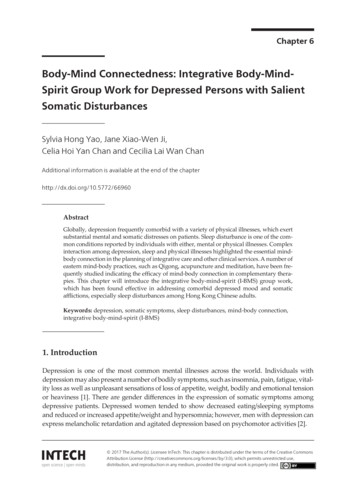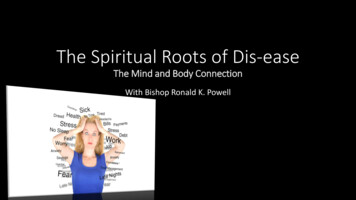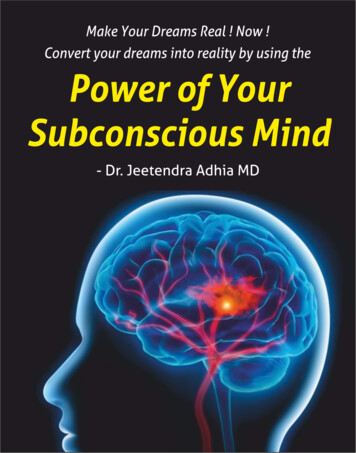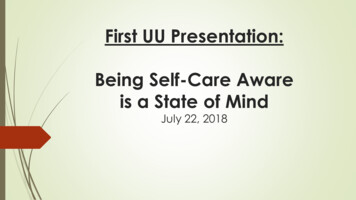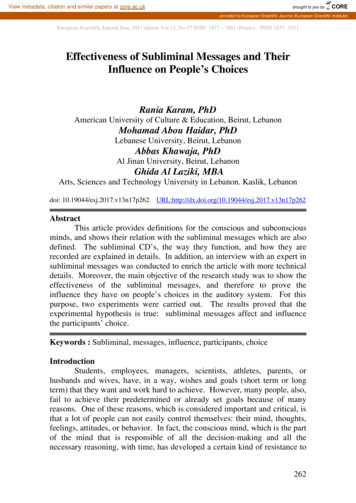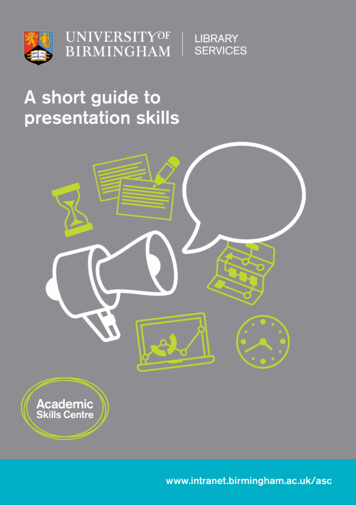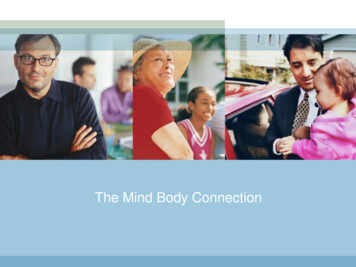
Transcription
The Mind Body Connection
PresenterLarry Waxman, MA, LPCLarry Waxman is a Licensed Professional Counselorpracticing in Raleigh, North Carolina and has been practicingcounseling for the last 15 years. He completed hisundergraduate degree at Bowling Green State University inOhio and his master’s degree at John F. Kennedy Universityin California. He holds a master’s degree in counselingpsychology with an emphasis on holistic studies.While completing his master’s degree he learned extensivelyabout the mind/body connection. Larry specializes in the mindbody connection and emphasizes the importance of this workin his practice with others utilizing relaxation techniques,meditation, mindfulness, and grounding exercises.During his spare time, Larry enjoys spending quality time withhis family and playing and watching sports. While living inCalifornia, he played semi-professional baseball. He is also anavid reef keeper and has a saltwater coral reef aquarium.
Reflective Activity
Learning Objectives Identify the connections between mind and body Practice the Relaxation Response Identify how to recognize and manage stressfulsituations Recognize the benefits of relaxing your mind and body
SurveyWhat people think and believe can affect their health.A. I agree with this statement.B. I disagree with this statement.C. I am unsure.
The Mind-Body Connection What people think and believe can affect their health Relaxation and stress management techniques help tomaintain a calm state during stressful situationsMindBody
How Thoughts Affect Well-Being Psychologists, including Aaron Beck and Albert Ellis,suggest that thoughts have a direct connection to yourstate of mind If you change your thinking, you can change yourfeelings and experience of stress Changing your emotional response may then have asubsequently positive effect on your physical health
Cerebral Functions: Thinking and Feeling
Effects of an Amygdala Attack Cognitive thinking stops. Impulsive feelings override rationality. Worry, anxiety, panic, frustration, and anger areexperienced. Knee-jerk reactions are triggered. The person “flies off the handle.”
Negative Impact of Stress on the BodyStressBody releaseshormonesHeart rate, bloodpressure, andbreathingincrease
Positive Impact of Thoughts on the BrainThoughts,feelings, andexpectationsBrain producesendorphins andgamma globulinNatural painkillerand immunesystemstrengthener
Benefits of Managing the Mind-Body Connection Decreases wear and tear on the body Decreases anxiety and pain Improves recovery time when recuperating Strengthens the immune system Improves self-control when handling stressful situations
Benefits of Knowing About the Mind-Body Connection Empowers you to embrace the positive responses Reduces the effect of negative responses Helps you recognize your own signs and symptoms Helps you identify when you need to take action Leads to better understanding of your stressors and waysto manage them
The Relaxation Response Developed by Dr. Herbert Benson Two step process:1.Repetition of a word, sound, or phrase2.Focus on the repetition as other everyday thoughts come tomind
Benefits of the Relaxation ResponseSlows down breathing and theheart beatReduces blood pressureEnhances resiliency whenpracticed regularly
Breathing Exercise Begin with regular breathing Focus on your breath Observe inhalation and exhalation Inhale for four counts Hold for seven counts Exhale for eight counts Breathe normally
Benefits of Using Breathing Exercises Shifts focus from outside to inside Controls stressful emotions and anxiety Increases energy and awareness Harmonizes nervous system Diverts attention to a safe place Centers the mind and quiets mental chatter
Additional Calming Exercises Progressive muscle relaxation Guided imagery Spiritual practices (e.g., centering prayer, meditation) Music and art therapy
SurveyWhich of these practices are you most likely to try?A. Relaxation ResponseB. Breathing exerciseC. Progressive muscle relaxationD. Guided imageryE. Spiritual practicesF. Music or art therapy
Useful Strategies for Dealing With Stressors Consider how your perceptions influence your responses Recognize that adaptability to change is personallybeneficial Openly discuss your feelings with loved ones and/or acounselor Stay physically active Seek medical advice about medication options Hold onto your sense of humor
Thank YouQuestions?
Works CitedBenson, H. (n.d.). The Relaxation Response. Retrieved March 8, 2016, fromhttp://www.relaxationresponse.orgCleveland Clinic. (n.d.). Mind Body Exercises. Retrieved March 8, 2016, bodyexercisesMartin, S. (2008). The Power of the Relaxation Response. Retrieved March 8, 2016, aspxMichigan Psychological Association. (n.d.). Mind-Body Health Connection. Retrieved March 8, 2016,from ndbody health connection.phpThompson, H. (n.d.). How Stress Impacts Emotional Intelligence and Leader Performance. RetrievedMarch 8, 2016, mlWebMD. (2014, November 14). Mind-Body Wellness – Topic Overview. Retrieved March 8, 2016, , A. (n.d.). Breathing: Three Exercises. Retrieved March 8, 2016, athing-exercises.html
about the mind/body connection. Larry specializes in the mind body connection and emphasizes the importance of this work in his practice with others utilizing relaxation techniques, meditation, mindfulness, and grounding exercises. During his spare time, Larry enjoys spending quality time with his family and playing and watching sports.

